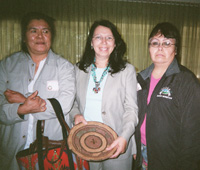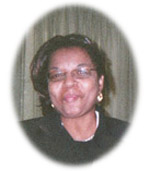Hurricane Damage in Houma Area
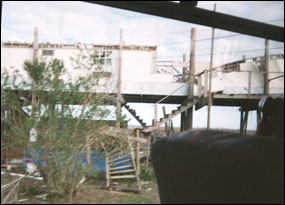 Many
Many Houma members suffered loss of home and livelihood as structures, possessions, and boats were damaged, uprooted, and soaked in the storms. During the preceding years, their inadequately protected lands – where they remembered playing ball and taking walks as children -- had become submerged in water or so soaked that it was no longer safe to walk there. The levees, which now seem only a few inches high, were overrun, and more than thirty-five hundred homes were flooded. The Houma members, like many community people in affected areas, experienced an inadequate response from the government and major relief agencies. They found also that people in rural places like theirs received even less attention and help than those in metropolitan areas. People with limited resources, most often people of color, were disproportionately affected.
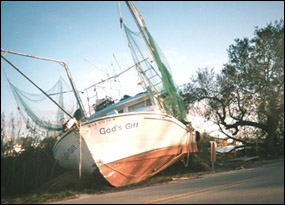
Role of Community Groups
Members of Rural Development Leadership Network, a national, multicultural social change organization of community builders and activists, conferred after Katrina hit, some offering to house evacuees, others to send needed items, others to lend their labor on the ground.
In responding to the disaster, RDLN members noted that local community organizations are the groups best able to respond to disasters and their aftermath. These groups know their communities and the people in them; they will not abandon them through ignorance, neglect, or delay. Leaders cited the example of the Community Council of Southwest Texas (headed by RDLN Field Advisor Jorge Botello), which in 1998 successfully rescued individuals from floodwaters in Del Rio and assisted their recovery, and the Federation of Southern Cooperatives (whose Director of Program Operations, John Zippert, is an RDLN Board Member and Treasurer), one of the few groups to work with poor farmers in affected areas. RDLN Leader Tirso Moreno, director of the Farmworkers Association of Florida traveled with colleagues to Alabama and Mississippi to locate and assist affected farmworkers, including undocumented workers. RDLN graduate Meredith Dean in Appalachia provided an article citing Cuba’s success in losing no lives from category 5 Hurricane Ivan in 2004, although the storm destroyed 20,000 homes. In the words of sociologist Dr. Nelson Valdes at the University of New Mexico, “the whole civil defense is embedded in the community to begin with (emphasis added).” The United Nations International Secretariat for Disaster Reduction director Salvano Briceno has called Cuba “an international model” in this regard.
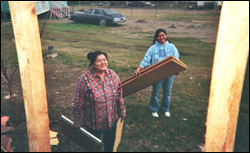 Local community groups in the U.S., however, do not have the funds needed to be at the forefront of disaster planning, rescue, and recovery efforts. In an article in the Chronicle of Philanthropy (January 26, 2006) Pablo Eisenberg, former President of the Center for Community Change and current senior fellow at the Georgetown University Public Policy Institute, slams the response of foundations in the wake of Katrina and Rita, stating that “just a trickle of foundation money has gone to grass-roots, advocacy, organizing, or other activist causes.”
Local community groups in the U.S., however, do not have the funds needed to be at the forefront of disaster planning, rescue, and recovery efforts. In an article in the Chronicle of Philanthropy (January 26, 2006) Pablo Eisenberg, former President of the Center for Community Change and current senior fellow at the Georgetown University Public Policy Institute, slams the response of foundations in the wake of Katrina and Rita, stating that “just a trickle of foundation money has gone to grass-roots, advocacy, organizing, or other activist causes.”
Contributions can be made to community groups, such as the following: |
|
Federation of Southern Cooperatives
21st Century Leadership Training Camp in Suttle, AL
www.federationsoutherncoop.com
Southern Mutual Help
www.southernmutualhelp.org
|
The People’s Institute for Survival and Beyond
www.pisab.org
ACORN Katrina Survivors Association
www.acorn.org/katrina
|
|
Long-Term Impact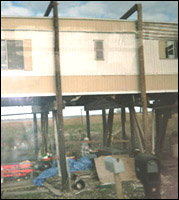
Ms. Caye and Ms. Hewankorn intend to return to the Houma area to provide longer-term volunteer assistance. First Nations OWEESTA will assist the Nation in developing its own Community Development Financial Institution (CDFI). A number of local business people received information and support during the meeting from organizations like the National Tribal Development Association, the U.S. Small Business Administration, and the Louisiana Interchurch Conference. Since the gathering, Emma Dixon has taken Oxfam on a tour of Houma and arranged another meeting for resource people in her hometown of Bogalusa.
Home
| What's New
|
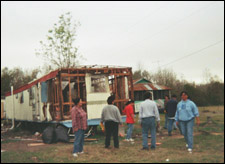 RDLN Leaders Monica Caye and Geri Hewankorn, members of the Kootenai tribe of the Flathead Reservation in Montana, traveled to Louisiana to help in Katrina recovery. The United Houma Nation -- Indians recognized by the state of Louisiana, but not by the Federal government -- provided an assignment to the volunteers: to tear down a damaged trailer so that a FEMA trailer could be put in its place. Family members doubled up with neighbors in a trailer next door in the meantime. It was the weekend of January 20-21, five months after the storm, and destruction and debris were still evident, amid signs of clean-up and rebuilding. The workgroup on the trailer demolition project included the following volunteers: Ron Verdun, Houma Tribal Council Member; Louise Billot, Houma staff; Stewart Sarkozy-Banoczy, First Nations OWEESTA Corporation; and RDLN delegates Monica Caye, Geri Hewankorn, and Starry Krueger.
RDLN Leaders Monica Caye and Geri Hewankorn, members of the Kootenai tribe of the Flathead Reservation in Montana, traveled to Louisiana to help in Katrina recovery. The United Houma Nation -- Indians recognized by the state of Louisiana, but not by the Federal government -- provided an assignment to the volunteers: to tear down a damaged trailer so that a FEMA trailer could be put in its place. Family members doubled up with neighbors in a trailer next door in the meantime. It was the weekend of January 20-21, five months after the storm, and destruction and debris were still evident, amid signs of clean-up and rebuilding. The workgroup on the trailer demolition project included the following volunteers: Ron Verdun, Houma Tribal Council Member; Louise Billot, Houma staff; Stewart Sarkozy-Banoczy, First Nations OWEESTA Corporation; and RDLN delegates Monica Caye, Geri Hewankorn, and Starry Krueger.